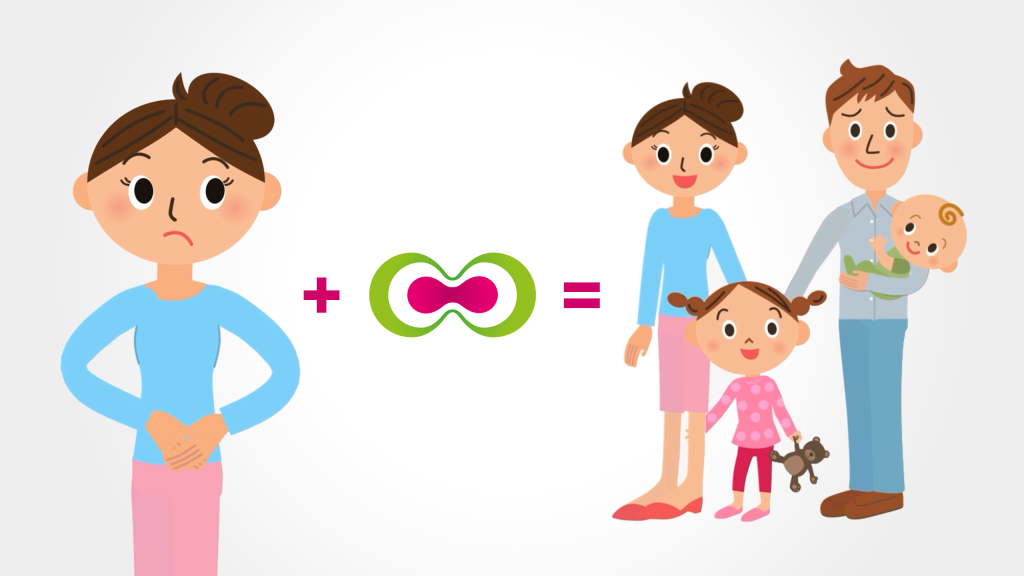Table of Contents
There is no doubt that it is very difficult for a couple to discover they are not able to have their own biological children. But fortunately, modern medicine now offers the opportunity to fight infertility. With the help of donor genetic material, such couples may now experience pregnancy and the birth of their child!
Knowing that you cannot have your own biological children is heartbreaking. But, along with adoption, artificial reproduction offers a viable solution. The donor program makes it possible for the couple to experience all the wonders of pregnancy and childbirth as well as the joy of raising their child together.
And with the latest scientific discovery, when it was found out that infertile women whose only option for a child is to use donor eggs do still pass their own DNA to their child, it is now making the whole emotional process for couples easier! One main sadness infertile women experience is that their child has none of their genetic information but this latest research shows in principle the baby will have some DNA from her even though the egg is from another woman! That is why she will pass her genetic information on to the baby as well. It is such an amazing discovery, making the donation process less challenging for so many couples!
We in ReproGenesis specialize in helping couples who are facing challenges of conceiving a child because they cannot produce healthy germ cells, suffer from genetic disorders or have undergone an oncological treatment that caused damage to biological cells.
ReproGenesis´ donor program is very detailed, our donor database became the most advanced in the Czech Republic, therefore we are immediately able to locate the best match for each couple in treatment. We focus on near-perfect match of couples´ physical features, character traits, hobbies, and interests while respecting personal wishes and specific needs. Our donor program includes: Donor eggs, Donor sperm, Donor embryos.
We know, that among the most frequently asked questions about donor programs is, why young women decide to donate oocytes since the donation process is for them much more challenging than for male donors. Well, egg donation the same as blood and plasma donation are a few of the many ways how to personally help. Potential donors are, within a personal interview, also asked about their motivation to donate and the most frequent responses include: I want to help… Someone close needs to get pregnant, is in need of donated eggs, or has trouble conceiving. If I help now, it is likely that when I might need help one day I would also find someone who will be willing to.
How are donors chosen in ReproGenesis?
Our requirements for a potential donor, in addition to all negative tests – blood tests to exclude infectious diseases (HIV, syphilis, hepatitis B and C, cytomegalovirus), genetic tests (karyotype and cystic fibrosis, SMA, FRAX), blood tests to determine blood group and Rh factor, hormonal tests, ultrasound scans are: BMI not exceeding 25, non-smokers, at least secondary education, absolutely no drugs use in past and no permanent medication use, also no psychiatric disorder and illness and no known hereditary diseases in family history.
Reasons for egg donor treatment
Egg donor treatment is a viable option for individuals and couples facing challenges with fertility. Below are some common reasons why egg donor treatment might be considered.
- ovaries have been removed or their function has been compromised by a chemotherapy
- ovaries no longer produce eggs
- ovaries are unable to produce healthy eggs
- ovaries produce eggs that carry a genetic disease
Egg donors
All egg donors are women 18-29 years of age. All of our donors are tested for mental diseases, genetic and hormonal disorders as well as infectious diseases including HIV. Women entering our egg donor database have undergone the following medical exams and procedures: an interview with a psychologist, an ultrasound exam, a check-up, tests for STDs (HIV, HBsAG, CMV, syphilis), a hormonal profile, blood and Rh typing and a genetic disorder screening test (karyotype, gene mutation, cystic fibrosis, Fragile X syndrome and Spinal muscular atrophy).
All egg donors hold a post-secondary degree or are currently enrolled in a post-secondary program. Under the laws of the Czech Republic, egg donation is anonymous. All donors are of Czech nationality. Only eggs from donors examined according to European Parliament and European Council Directive 2004/23/ES and Act No. 296/2008 and Regulation 422/2008 are used in treatments where donated germ cells are required.
Related reading: How much does it cost for donor egg IVF?
Reasons for sperm donor treatment
Sperm donor treatment offers a valuable solution for individuals and couples experiencing difficulties with male infertility or other reproductive challenges. Below are some common reasons why sperm donor treatment may be chosen.
- testes have been removed, or their function has been compromised by a chemotherapy
- sperm quality test shows too many abnormalities
- semen includes no sperm
- the sperm carries a genetic disease
Sperm donors
All sperm donors are men 18-35 years of age. All of our donors are tested for mental diseases, genetic and hormonal disorders as well as infectious diseases including HIV. Men entering our sperm donor database have undergone the following medical exams and procedures: an interview with a psychologist, a checkup, tests for STDs (HIV, HBsAG, CMV, syphilis, chlamydia), blood and Rh typing and a genetic disorder screening test (karyotype, gene mutation and cystic fibrosis). All sperm donors hold a post-secondary degree or are currently enrolled in a post-secondary program.
Under the laws of the Czech Republic, sperm donation is anonymous. All donors are of Czech nationality. Only sperm from donors examined according to European Parliament and European Council Directive 2004/23/ES and Act No. 296/2008 and Regulation 422/2008 are used in treatments where donated germ cells are required.
Reasons for donor embryo treatment
Donor embryos are the result of combining donor eggs with donor sperm, so the reasons for treatment are a combination of egg donor and sperm donor treatment reasons:
- ovaries cannot produce healthy eggs
- eggs carry a genetic disease
- sperm quality test shows too many abnormalities
- semen includes no sperm
- sperm carries a genetic disease
- no successful treatment with the couple’s own embryos
Within our donor program ReproGenesis guarantees
For a cycle with donor eggs:
- a donor who meets your requirements
- all the eggs from your donor; that normally means 6 to 8 quality eggs
- two quality embryos will be ready for the transfer after the five-day cultivation
For a cycle with donor embryos (fresh embryos):
- an egg donor who meets your requirements
- a sperm donor who meets your requirements
- all the eggs from your donor; that normally means 6 to 8 quality eggs
- a minimum of two quality embryos for the transfer after five-day cultivation
- a minimum of two quality embryos for freezing after five-day cultivation
For a cycle with donor embryos (frozen embryos):
- embryos which meet your requirements
- freezing of embryos is conducted after five days of cultivation, when they are in the blastocyst stage
- the option to choose a transfer of one or two embryos
- embryos are selected and frozen once they have reached blastocyst stage, Embryoscope is used for the selection – Embryo Monitoring
When one IVF cycle is conducted, the success rate of treatment with donor eggs and donor embryos is between 48% and 68% (only clinical pregnancies are included in the rate, i.e. when fetal heartbeat is confirmed during an ultrasound examination). The success is closely related to the recipient’s age and with the quality of her endometrium. However, up to 90% of patients become pregnant during the course of three treatments with donor eggs or donor embryos (fresh embryos).
We would like to support you in your effort to overcome the obstacles on your way to parenthood by offering the following: if you repeatedly undergo your treatment with donor eggs or donor embryos (fresh, not frozen) at our clinic, we can offer you the so called „Shared Risk Program“.
- the first treatment cycle is covered by the treated couple in full, as per our current price list
- if a second cycle is necessary, the treated couple covers the full price, as per our current price list
- in the case of a third cycle, only a part of the treatment is covered by the patient, the costs of embryological procedures (i.e. ICSI, prolonged cultivation and assisted hatching) as well as Embryo Monitoring are covered by ReproGenesis
The treatment involving donor gametes may result in multiple embryos. Healthy embryos that are not transferred into the uterus may be frozen for future use. If pregnancy is achieved, it is possible to implant embryos from the same cycle to produce biological siblings for your child.
Of course, it is also possible to use additional donor material from the same donor whose biological material resulted in a successful pregnancy, if the additional material is available.
A treatment cycle with donor eggs takes 4 to 6 weeks.
Let us help you, we do know how.
ReproGenesis Team.





